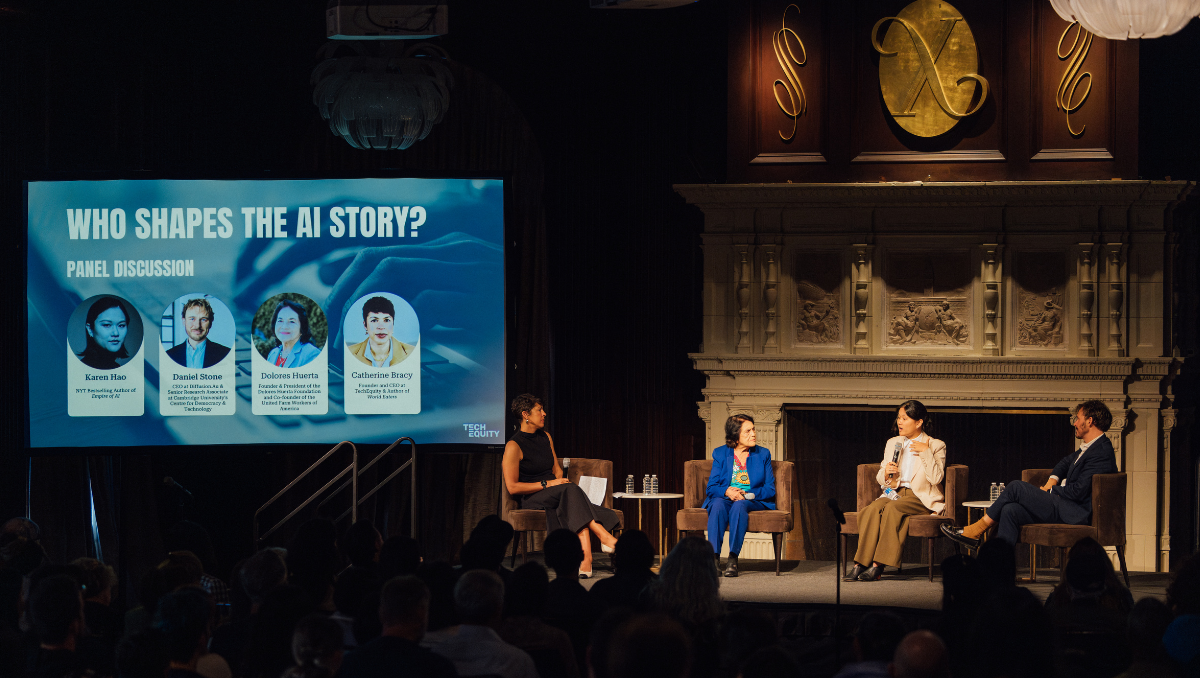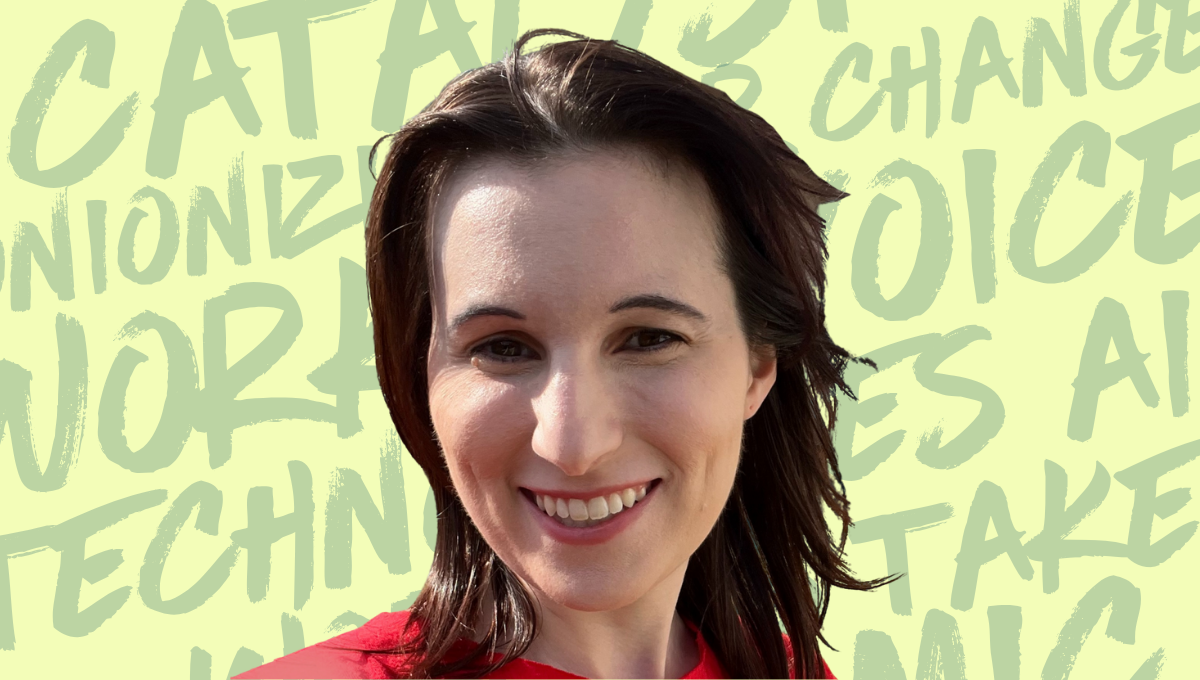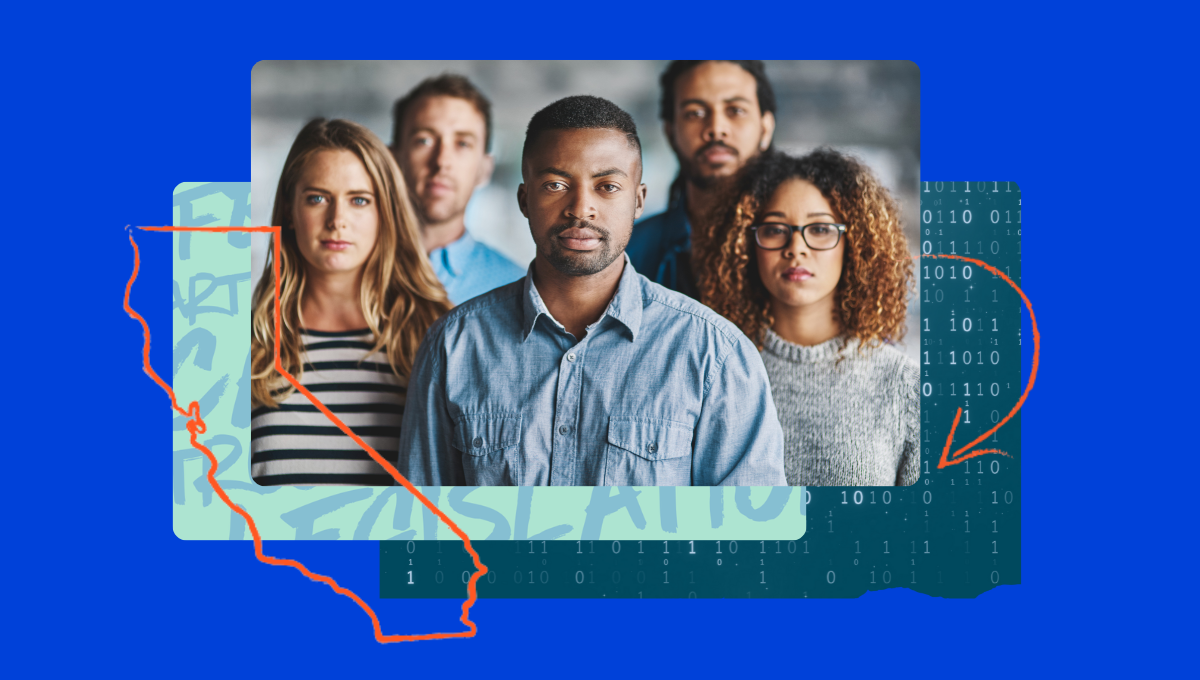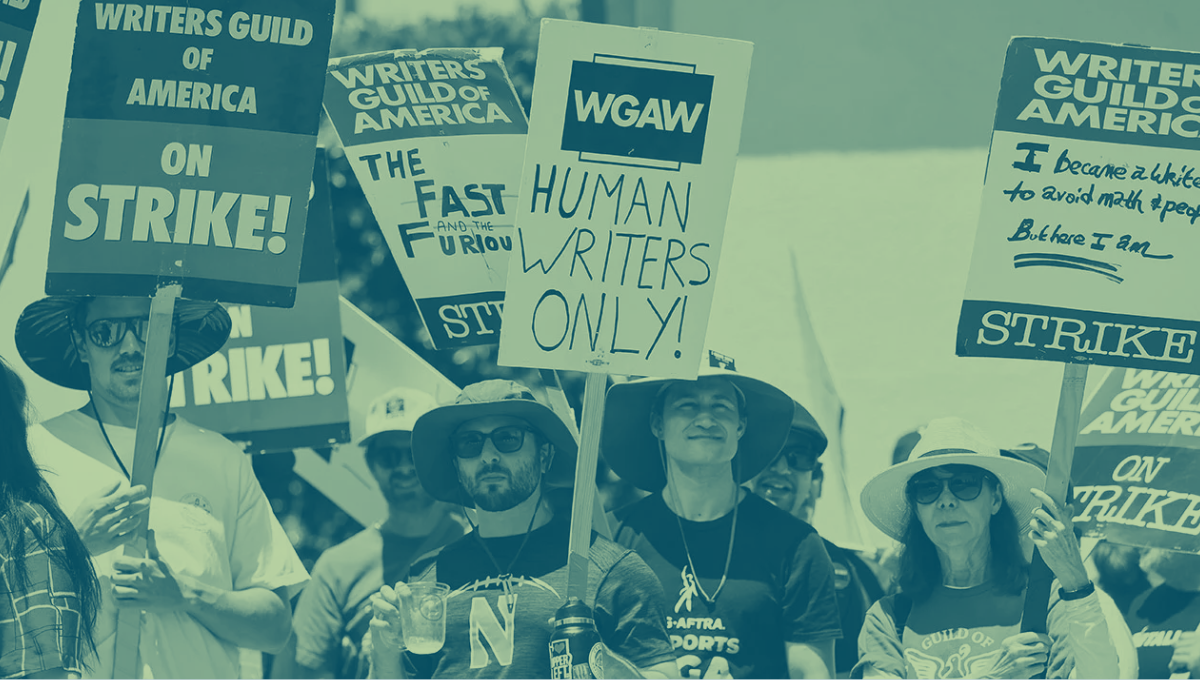AI, the California Legislature, & the Will of the Governor
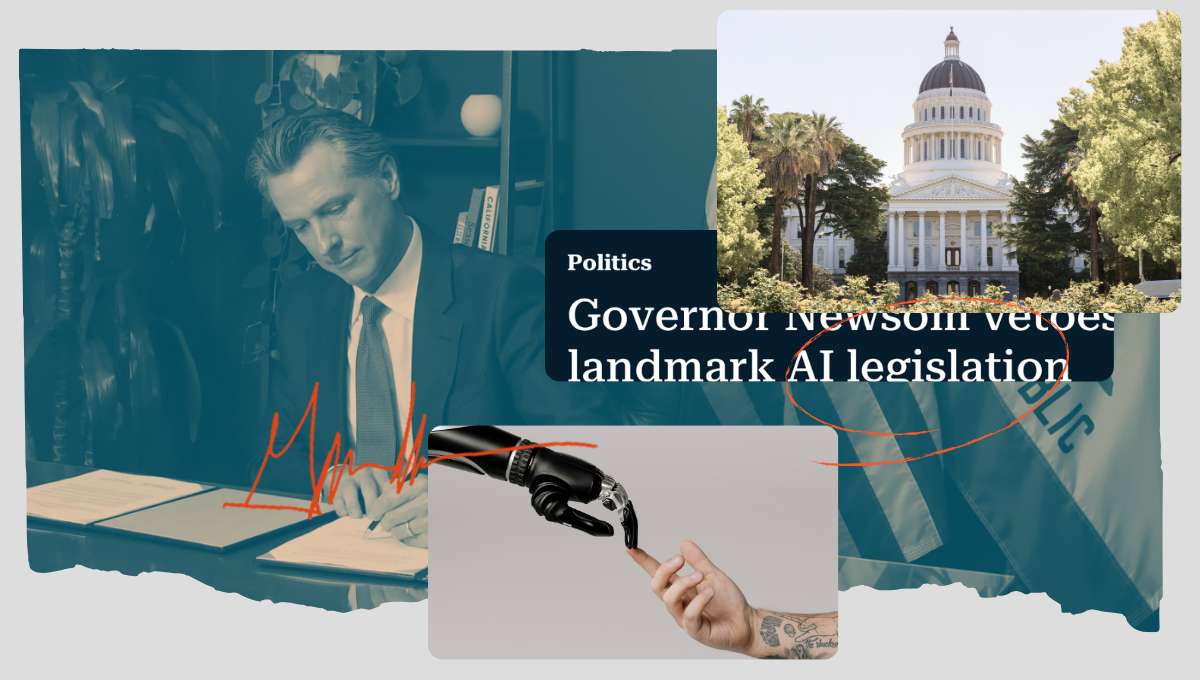
In 2024, TechEquity launched its People-First AI campaign, an effort to address how AI is rapidly changing our economy, communities, and lives. With the emergence of this technology onto the main stage, the political theater also began. Dozens of legislators—and tech company lobbyists—rushed to craft proposals to address everything from deepfakes to disinformation.
At the start of the California Legislative session, 62 bills related to AI were introduced; that number has whittled down to 24 that were signed into law. Read on to get an overview of the AI bills that shaped the session, what moved forward, what didn’t, and what became law.
If you need additional background, check out What exactly is Artificial Intelligence? And other questions, answered on our blog for a general primer on AI before diving in.
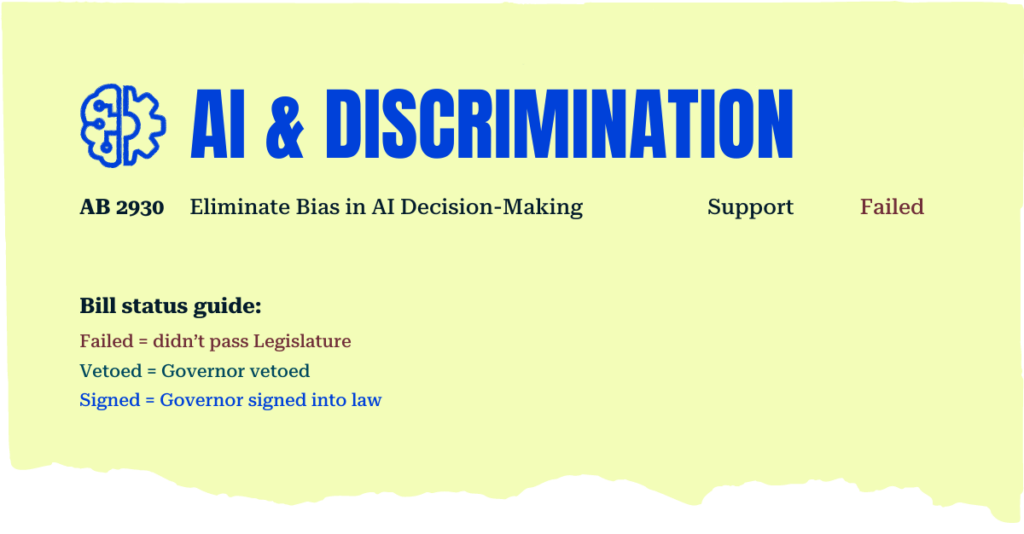
AI & Discrimination
Signed into law
None.
Vetoed
None.
Did not pass
One of the most discussed topics in the AI debate is discrimination. It featured prominently in the White House AI Bill of Rights and has been the subject of numerous reports, studies, and investigations. However, very little regulation has been passed to ensure that AI does not further discriminate and that people know when they are subject to an AI system that may result in a discriminatory outcome.
There were many attempts to get at this issue within the California legislature, the most expansive of which was AB 2930, a bill by Assemblymember Bauer-Kahan (D-San Ramon) that would have required developers and deployers of these systems to test them for bias and produce impact assessments before their use in making decisions on things like healthcare, housing, employment, and more. The bill was narrowed substantially in the Senate Appropriations Committee to only cover employment decisions and Asm. Bauer Kahan decided not to move forward with the bill. TechEquity was a proponent of the policy.
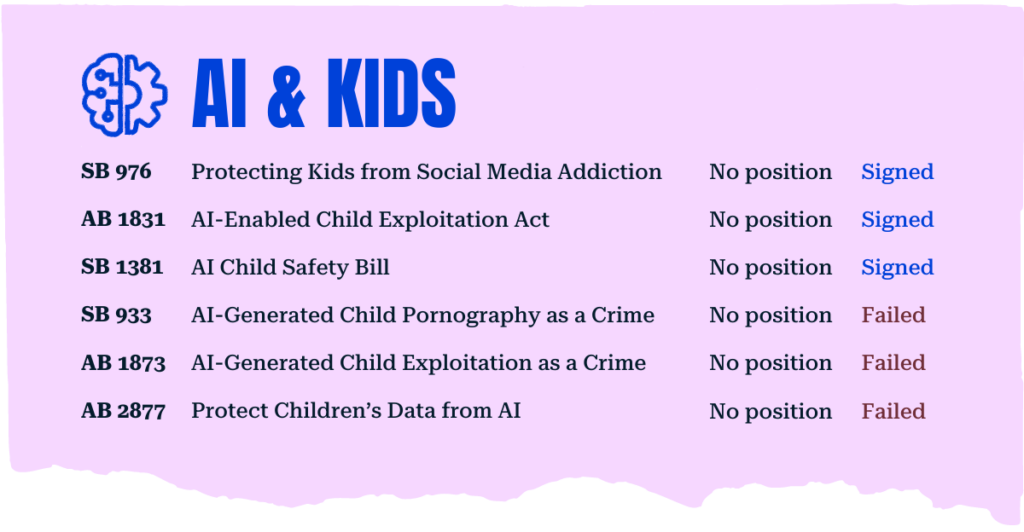
AI & Kids
Signed into law
SB 976 by Senator Skinner (D-Berkeley) was signed into law by Governor Newsom. Under the law, social media companies must present content in chronological order to children, rather than through algorithmic curation, unless they get permission from a parent or guardian. The bill also limits notifications during school hours and between midnight and 6 am.
Several bills sought to address AI and child exploitation this session. Senator Berman’s (D-Palo Alto) proposal AB 1831 was signed into law to expand the definitions around child pornography to include pornography created by generative AI. Also signed was SB 1381 by Senator Wahab (D-Hayward).
Vetoed
None.
Did not pass
Sen. Wahab (D-Hayward) introduced SB 933 and Assemblymember Sanchez (R-Rancho Santa Margarita) introduced AB 1873; both proposals failed to advance.
AB 2877 would have prevented AI companies from using the data of children under the age of 16 to train their models, but the bill by Assemblymember Bauer Kahan (D-San Ramon) failed to advance.
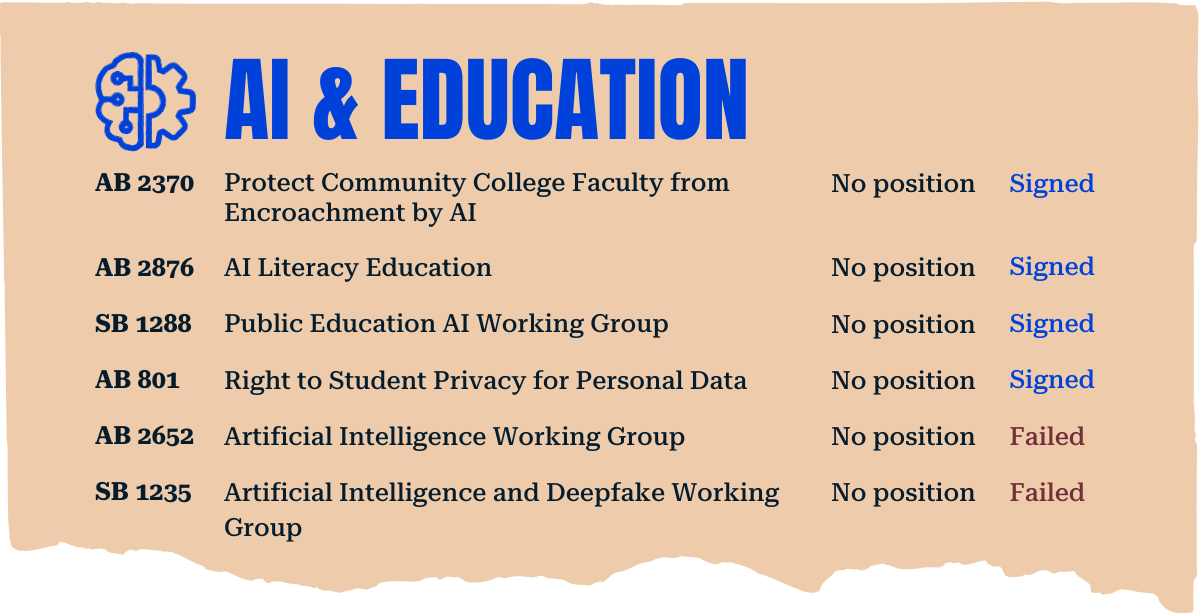
AI & Education
Signed into law
AB 2370 by Assemblymember Cervantes (D-Riverside) was one of a handful of bills quickly signed into law by the Governor at the beginning of the signing period. The bill will protect the jobs of community college instructors by requiring courses to be taught by a human professor, not by AI.
Assemblymember Berman’s (D-Palo Alto) proposal, AB 2876, to help kids learn AI media literacy by creating a commission to develop recommendations for curriculum and develop criteria for evaluating instruction materials that use AI, was signed into law.
A bill by Assemblymember Joe Patterson (R-Fresno), AB 801, will allow students, parents, and guardians to be able to require that third-party vendors delete identifying information related to the student if they are no longer enrolled in the school. The bill was signed into law by Governor Newsom.
Also signed was SB 1288 by Senator Becker (D-Menlo Park), which requires a working group to develop guidance for school districts, county offices of education, and charter schools on the safe use of artificial intelligence in education, and to develop model policy for those local educational agencies.
Vetoed
None.
Did not pass
AB 2652 by Assemblymember Muratsuchi (D-Torrance) would have required the Superintendent, in consultation with the State Board of Education, to convene a working group to explore how artificial intelligence is currently being used in education, identify how it may be used in the future, and develop best practices. The proposal didn’t move forward, but other bills with a similar aim were also put forth.
Assemblymember Gonzalez’s (D-Long Beach) bill, SB 1235, would have established a deepfake working group at California State University, Long Beach, in consultation with colleges and universities, if it had progressed.
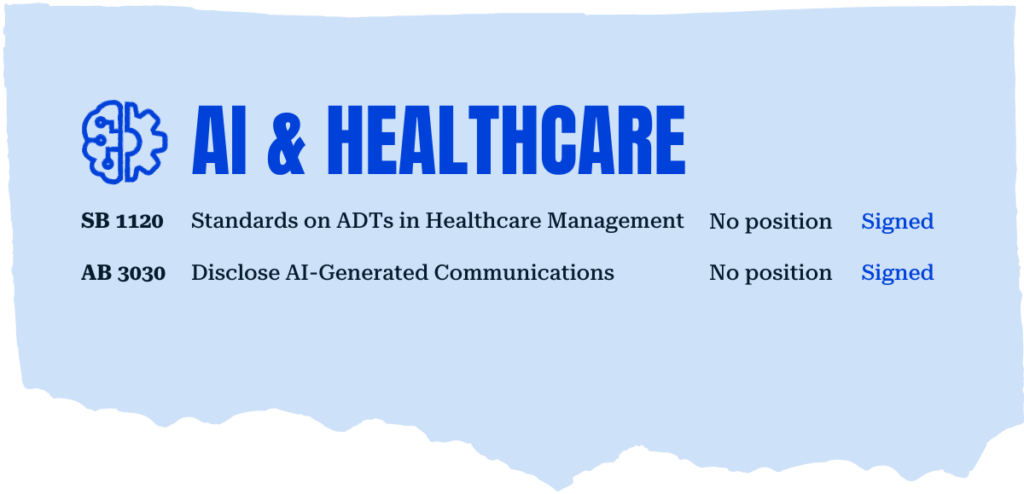
AI & Healthcare
Signed into law
A proposal on ADTs in healthcare, authored by Senator Backer (D-Menlo Park), SB 1120, set standards for using ADTs in management decisions, which was signed into law.
Assemblymember Calderon (D-City of Industry) authored AB 3030 to require medical practices that use generative artificial intelligence to produce written or verbal patient communications to patients that disclose what was generated by AI and have clear instructions for the patient on how they can contact a human health provider. The bill was signed by the Governor.
Vetoed
None.
Did not pass
None.
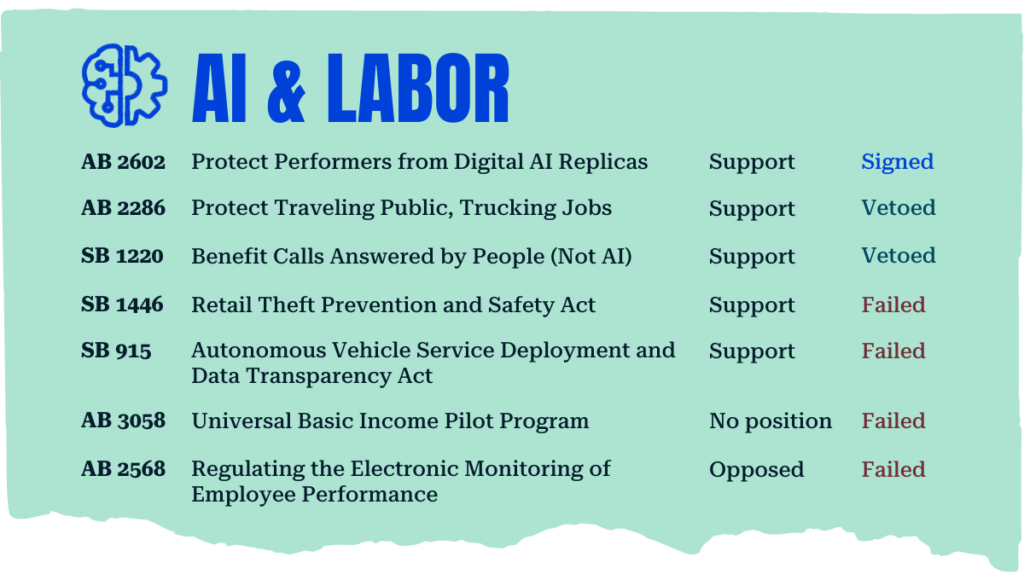
AI & Labor
Signed into law
AB 2602 by Assemblymember Kalra (D-San Jose), which will prevent employers from using AI-generated digital replicas in lieu of human performers and would not allow employers to use an AI version of a performer’s voice or likeness if the work could have been done in person. TechEquity supported this bill. [This bill also appears in the AI & Disinformation section.]
Vetoed
SB 1220 by Senator Limon (D-Santa Barbara) was vetoed by Governor Newsom; the bill would have required state agencies that maintain phone lines for public benefit services like 211 to have those lines be serviced by workers employed in California and not automated by AI call services, preserving those jobs. TechEquity supported the bill.
AB 2286 carried by Assemblymember Aguiar-Curry (D-Davis) would have required self-driving trucks weighing over 10,000 pounds, like those used for long-haul freight trucking, to have a trained human operator behind the wheel, had the Governor not vetoed it. This duo of bills make up the CARS Package put forth by the Teamsters Union, which represents thousands of trucking and commercial drivers in the state. TechEquity supported this bill. [This bill also appears in the AI & Safety section.]
Did not pass
A bill by Asm. Low, AB 3058, which would have established a universal basic income (UBI) pilot program through the Employment Development Department, would have provided assistance to those who become unemployed due to automation or AI, providing $1000 per month for a year to help workers recover and retrain.
A proposal to require grocery stores and pharmacies to complete an assessment before implementing new technologies significantly affect essential job functions or would eliminate jobs, SB 1446 by Senator Smallwood Cuevas (D-Los Angeles), didn’t advance. The bill would have also placed guardrails around self-checkouts, requiring the store to have one employee assigned to monitor no more than two self-service stations. TechEquity supported this bill.
A bill that stalled out, AB 2568 by Assemblymember Pacheco (D-Downey), would have required larger employers with 250 or more workers to provide limited notice to workers and allow employers to collect workers’ personal information and surveil them through electronic monitoring. TechEquity opposed this bill.
SB 915, authored by Senator Cortese (D-San Jose), would have required autonomous vehicle companies to get local municipality approval to allow autonomous vehicles to be tested on their roads and set limitations on the number of vehicles deployed and hours they are tested. The bill stalled in the legislature before reaching the Governor. TechEquity supported this bill. [This bill also appears in the AI & Safety section.]
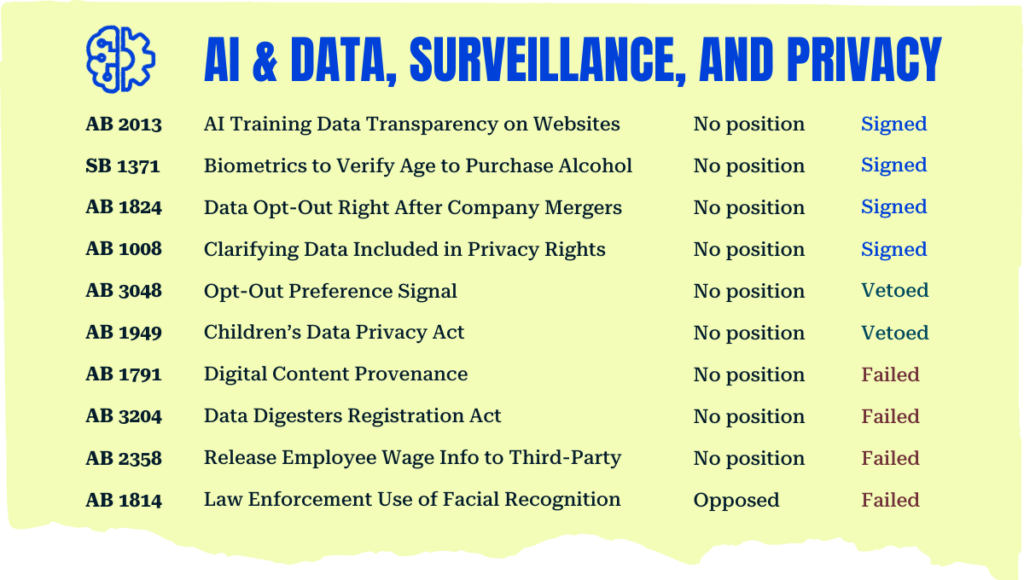
AI & Data, Surveillance, and Privacy
Signed into law
AB 2013, by Assemblymember Irwin (D-Thousand Oaks), was signed by the Governor and will require AI developers to post information on the data used to train the AI system or service on their websites.
Senator Bradford (D-Inglewood) put forth SB 1371, a bill that would allow the use of biometric systems, like facial scans, to verify age for the purchase of alcohol, which Governor Newsom signed.
Multiple bills attempted to update the California Consumer Privacy Act, two of them: AB 1824 by Assemblymember Valencia (D-Anaheim), and AB 1008 by Assemblymember Becker (D-Menlo Park) were signed into law.
Vetoed
Two additional bills to update the California Consumer Privacy Act: AB 3048 by Assemblymember Lowenthal (D-Long Beach) and AB 1949 by Assemblymember Wicks (D-Oakland); both were vetoed.
Did not pass
AB 1791 by Assemblymember Weber (D-La Mesa) would have required a social media platform to redact personal data from content uploaded to the social media platform by a user in an effort to protect social media users from personal information being misused; the bill didn’t move forward.
A bill by Assemblymember Bauer Kahan (D-San Ramon), AB 3204, would have required data digesters—a business that uses personal data to train AI—to register with the Consumer Privacy Protection Agency. The agency would have created a publicly accessible website where this registration information could be found and created a fund known as the “Data Digester Registry Fund” to bring greater transparency to which companies are using personal data; the bill failed to advance to the Governor’s desk.
AB 2358 by Assemblymember Low (D-Sunnyvale) would have required the Employment Development Department to release an employee’s wage information to a qualified third-party vendor if the employee had provided the department written permission for that release.
AB 1814 by Assemblymember Ting (D-San Francisco) purported to prevent law enforcement from using facial recognition as the sole basis for probable cause in their investigations. However, the policy was rife with flaws, and TechEquity, alongside many of our partners, opposed it. The bill stalled out before reaching a floor vote.
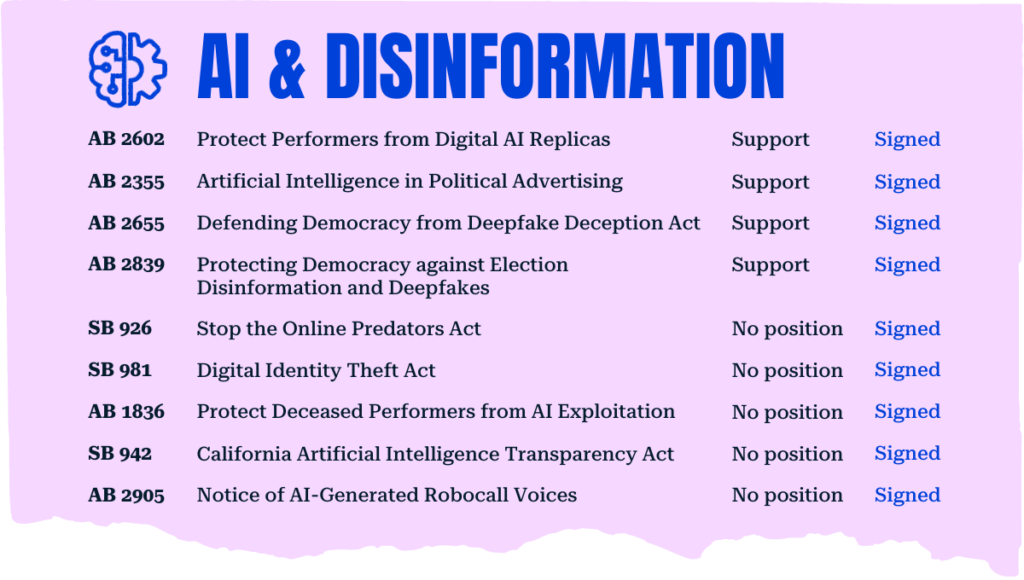
AI & Disinformation
Signed into law
SB 926 makes it a crime for a person who is 18 years of age or older to intentionally create and distribute or cause to be distributed any photorealistic image, digital image, electronic image, computer image, computer-generated image, or other pictorial representation of an intimate body part. SB 981 requires a social media platform to provide a mechanism that is reasonably accessible to a reporting user who is a California resident who has an account with the social media platform to report sexually explicit digital identity theft to the social media platform. Both bills by Senator Wahab (D-Hayward) were signed into law by Governor Newsom.
GenAI has been used by Hollywood to help finish the production of films when actors meet untimely deaths or are otherwise unable to complete (or reprise) their roles. Assemblymember Bauer Kahan (D-San Ramon) bill AB 1836, was signed by the Governor, which will impose liability for using a deceased person’s voice or likeness in a production without express prior consent.
Also signed into law was AB 2602 by Assemblymember Kalra (D-San Jose), which will prevent employers from using AI-generated digital replicas in lieu of human performers and would not allow employers to use an AI version of a performer’s voice or likeness if the work could have been done in person. TechEquity supported this bill. [This bill also appears in the AI & Labor section]
SB 942 by Senator Becker (D-Menlo Park) requires companies to provide tools to consumers to identify GenAI and deepfakes, which the Governor signed.
The Governor signed AB 2655 by Senator Berman (D-Palo Alto) to fight online election disinformation by requiring social media platforms to label election-related deepfakes posted by users and ban the worst, most obvious cases close to elections.
AB 2839 by Assemblymember Pellerin (D-Santa Cruz) prohibits the knowing distribution of an advertisement or other election communication that contains materially deceptive and digitally altered or digitally created images, audio, or video, with the intent to influence an election or solicit funds for a candidate or campaign; Governor Newsom signed it into law. A bill that requires labeling of AI-generated content in political ads by Assemblymember Carillo (D-Palmdale), AB 2355, also became law. TechEquity supported both of these bills.
Robocalls may continue to be disliked by much of the public, especially during election season when they increase. Now, at least you’ll know when they are AI-generated, thanks to AB 2905 by Assemblymember Joe Patterson (R-Fresno), which was also signed into law.
Vetoed
None.
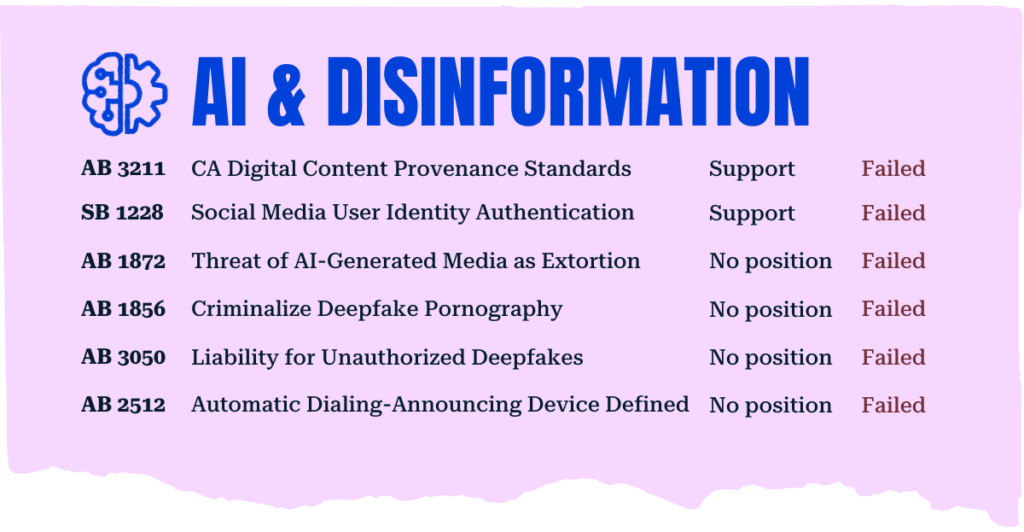
Did not pass
A bill by Assemblymember Wicks (D-Oakland), AB 3211, which would have required generative AI companies to embed digital provenance data within the digital media they create so we know which images, video, and audio were digitally created, when they were created, and who they were created by, didn’t advance through the Legislature. TechEquity supported the proposal.
AB 1872 by Assemblymember Sanchez (R-Rancho Santa Margarita) would have provided that a threat to post, distribute, or create AI-generated images or videos of another may also induce fear sufficient to constitute extortion. Assemblymember Ta (R-Westminster) introduced AB 1856 to criminalize the distribution of deepfake pornography.
AB 3050 by Assemblymember Low (D-Sunnyvale) would have provided that an AI-generating entity or individual that creates a deepfake using a person’s name, voice, signature, photograph, or likeness in any manner without permission from the person being depicted in the deepfake, is liable for the actual damages suffered by the person or persons as a result of the unauthorized use. The bill did not advance.
AB 2512 by Assemblymember Jim Patterson (R-Fresno) would have expanded the definition of “automatic dialing-announcing device” to include calls made using an artificial voice, but it failed to advance through the legislature.
An effort to disarm anonymous trolls by Assemblymember Padilla (D-Chula Vista) didn’t move forward through the Legislature. SB 1228 required social media platforms to seek escalating levels of identifying information from their most influential users. Users who fail to provide identity info are not banned but labeled “identify unverified,” providing the public with more information on which power users will stand by their statements. TechEquity supported the bill.
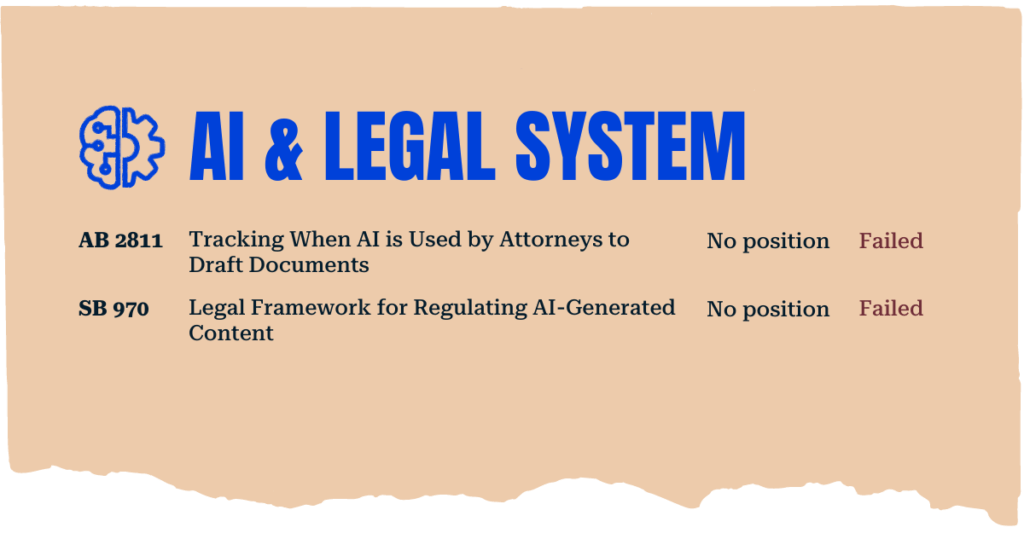
AI & Legal System
Signed into law
None.
Vetoed
None.
Did not pass
As AI comes into use in more industries and professions, Assemblymember Lowenthal (D-Long Beach) introduced AB 2811 to require attorneys to keep records of when they used AI to assist in the drafting of documents, but the proposal stalled.
SB 970 by Senator Ashby (D-Sacramento) would have required the Judicial Council to review the impact of artificial intelligence on the introduction of evidence in court proceedings and develop rules for courts in assessing claims that evidence that is being introduced has been generated by or manipulated by artificial intelligence; the bill failed to move forward.

AI & Government
Signed into law
None.
Vetoed
A bill dealing with how AI is used to deliver public services, SB 892 by Senator Padilla (D-Chula Vista), would have required the Department of Technology to develop a clear set of guidelines for evaluating automated decision tools prior to procurement and use of these technologies by the state—particularly in areas that have a high impact on individual rights, like healthcare, housing, education, employment, credit, child welfare, immigration, and more. TechEquity supported the bill, which Governor Newsom vetoed.
Did not pass
None.
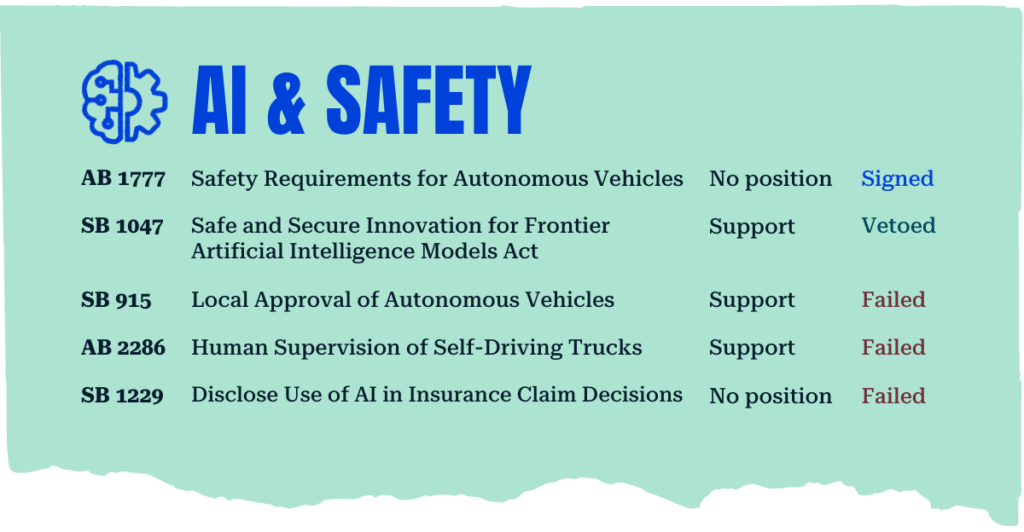
AI & Safety
Signed into law
The Governor signed Assemblymember Ting’s (D-San Francisco) AB 1777, which establishes safety requirements of companies deploying autonomous vehicles, including the company maintaining a dedicated emergency response line, allowing local police and fire to speak with remote operators of the vehicle.
Vetoed
The bill with perhaps the most press around it in this year’s session was Senator Wiener’s (D-San Francisco) SB 1047. The bill would have held AI companies liable for catastrophic harms their “frontier” models may cause to get ahead of possibly catastrophic, existential threats that these technologies hold. The bill called for public compute infrastructure for large, language models and whistleblower protections for tech workers who raise the alarm about risky behavior at AI companies like a group of OpenAI workers did earlier this year. The Governor vetoed the bill.
Did not pass
SB 915, authored by Senator Cortese (D-San Jose), would have required autonomous vehicle companies to get local municipality approval to allow autonomous vehicles to be tested on their roads and set limitations on the number of vehicles deployed and hours they are tested. The bill stalled in the legislature before reaching the Governor. [This bill also appears in the AI & Labor section.]
AB 2286 carried by Assemblymember Aguiar-Curry (D-Davis) would have required self-driving trucks weighing over 10,000 pounds, like those used for long-haul freight trucking, to have a trained human operator behind the wheel, had the Governor not vetoed it. This duo of bills make up the CARS Package put forth by the Teamsters Union, which represents thousands of trucking and commercial drivers in the state. [This bill also appears in the AI & Labor section.]
Another failed bill on ADTs was carried by Senator Nguyen (R-Huntington Beach), SB 1229, which would have required disclosure to applicants of the use of AI in their property and casualty insurance claim decisions.
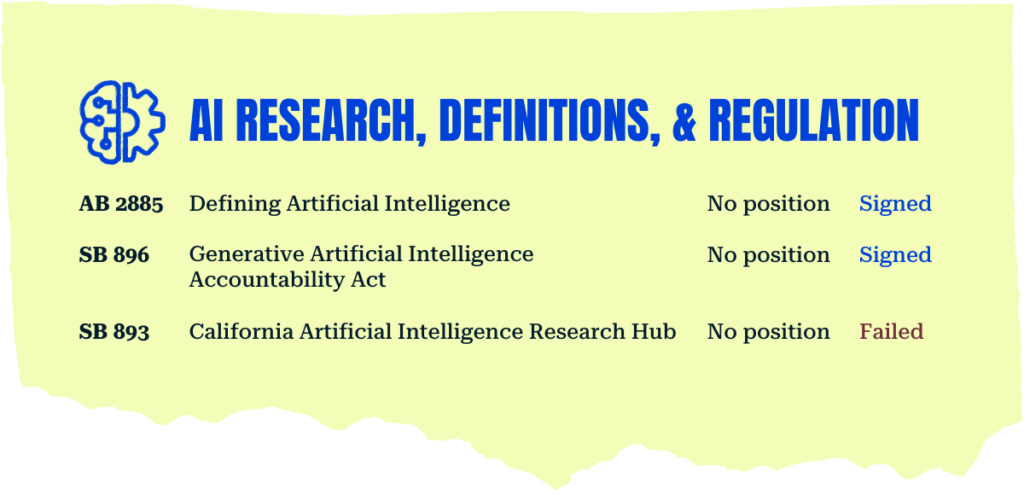
AI Research, Definitions, & Regulation
Signed into law
AB 2885 by Assemblymember Bauer Kahan (D-San Ramon) defines the term artificial intelligence to mean “an engineered or machine-based system that, that varies in its level of autonomy and that can, for explicit or implicit objectives, infer from the input it receives how to generate outputs that can influence physical or virtual environments.” This bill helps set forth the state’s legal definition of AI, a crucial step in regulating the technology, the Governor signed it into law.
SB 896 codified Governor Newsom’s Executive Order on Generative AI, Senator Dodd (D-Napa) introduced SB 896, and the Governor signed it.
Vetoed
None.
Did not pass
SB 893 by Senator Padilla (D-Chula Vista) would have established the California Artificial Intelligence Research Hub within the Government Operations Agency to serve as a centralized entity to facilitate collaboration between government agencies, academic institutions, and private sector partners to advance artificial intelligence research and development while safeguarding privacy, advancing security, and addressing risks and potential harms to society. The bill didn’t advance past Appropriations.
What we can learn from this year’s session
If you’ve made it to the end of this round-up, congratulations, it was a doozy! AI is a rambling, expansive topic that touches on many areas of the law and our lives, and there are sure to be many, many more bills on the topic in the 2025 legislative session.
In the end, Governor Newsom signed into law 24 of the bills we were tracking and vetoed six.
Of the more than 60 bills that entered the fray at the start of this session, only two-fifths made it to the Governor’s desk. Many of those bills were deeply amended, cut back, and watered down through aggressive and persistent industry lobbying.
If you want to be a part of building a people-first approach to tech and AI, join us!

